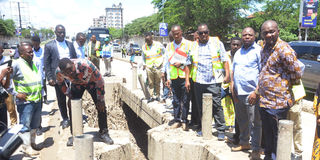Prime
Rain impact exposes Dar master plan inadequacies

Works minister Innocent Bashungwa (bending, left), Minister of State in the Office of the President (Regional Administration and Local Government) Mohamed Mchengerwa (right) and Dar es Salaam regional commissioner Albert Chalamila (second right) assess the damage at Jangwani Bridge in Dar es Salaam yesterday following several days of heavy rains in the city. PHOTO | SAID KHAMIS
What you need to know:
- Recent rains have laid bare the city’s unpreparedness, exposing vulnerabilities in its infrastructure and highlighting a lack of climate resilience.
Dar es Salaam. The devastating impact of the ongoing rains on infrastructure in Dar es Salaam has exposed flaws in the city’s master plan, available information shows.
In its plan, Dar es Salaam is defined as "a sustainable, competitive and people-centred city" with the target meant to be achieved by 2025.
But the recent rains have laid bare the city's unpreparedness, exposing vulnerabilities in its infrastructure and highlighting a lack of climate resilience.
This raises questions about the city's ability to meet its envisioned objectives and underscores the urgent need for strategic interventions to address these challenges.
Speaking to The Citizen, the director of the Institute of Resource Assessment at the University of Dar es Salaam (UDSM), Prof Pius Yanda, said these recent city flooding events have highlighted the urgent need for a review of city plans, incorporating a climate lens.
This, he said involves the design of expected infrastructure and ensuring the involvement of climate experts in planning to provide accurate climate change projections in the future.
"This is crucial because climate change is here to stay. The impact is evident and will grow significantly over time," said Prof Yanda.
In its sustainable vision on the Dar City Master Plan 2016-2036, the government highlighted that the focus is on enhancing resilience to climate change impacts, and on improving environmental conditions.
This vision of the master plan, is now more momentous as the climate change woes come with a cost to the city infrastructures.
Prof Yanda emphasized that without resilient climate planning in infrastructure, there could be substantial future costs, as administrations would require substantial funds to make adjustments to the infrastructure.
"It becomes a cycle. Every heavy rainfall or flood necessitates infrastructure repairs. It's essential to establish the right infrastructure that can withstand changes; it's time for architects and climate experts to go back to the drawing board,” he said.
Prof Yanda also underscored the importance of education and advocacy, as some areas experience flooding due to clogged drainage systems caused by human-generated solid waste.
"Some changes are behavioural; education is crucial, especially regarding waste management,” he said.
Data by the Bank of Tanzania (BoT) indicate that the City gross domestic product (GDP) was at Sh29 trillion by the end of 2022, contributing the highest as a single region at 17.1 percent to the country’s total GDP.
In the master plan, the government plans to transform Dar city into an international competitive city in attracting investments and businesses and locally by reinforcing the role of the city as a National Commercial Hub and promoting innovation centres and business incubators.
The plan was also to transform the city into a people-centred city that provides equal access to basic services and livelihood opportunities for all.
The recent rainy season which started in November and expected to last until April 2024, has wreaked havoc to the economic activities in many parts of the city.
In addition to households' damages, several bridges linking the city centre and its suburbs have been swept away by the ravaging floods rendering communication and transportation between the different parts of the city to be quite difficult.
City areas that suffers severe floods every year during rainy seasons included Jangwani, Kigogo, Tandale, Mbagala, Kigamboni Tuangoma,Mburahati, Mtoni Kijichi, Mbezi beach and Msasani.
Speaking with sister paper Mwananchi about these challenges, some Dar residents and business owners have claimed that the rains have disrupted some of their activities significantly and it has heightened safety concerns.
"We, the residents of the lowlands, sleep with anxiety, fearing that water will enter our homes. We spend the nights filling sandbags to prevent flooding," said Khadija Ali, a resident of Kawe Marani.
Mr Omary Pambe, a bodaboda driver, mentioned that this situation has deprived them of passengers because many of their customers are business people from various areas, including Mwenge.
"The passengers I pick up are usually doing business in Mwenge. When it rains, they say there is no business, so they stay at home. The passengers we do get say we don't have rain covers, and they don't want to get wet, so they don’t use bodaboda anymore," he said.





